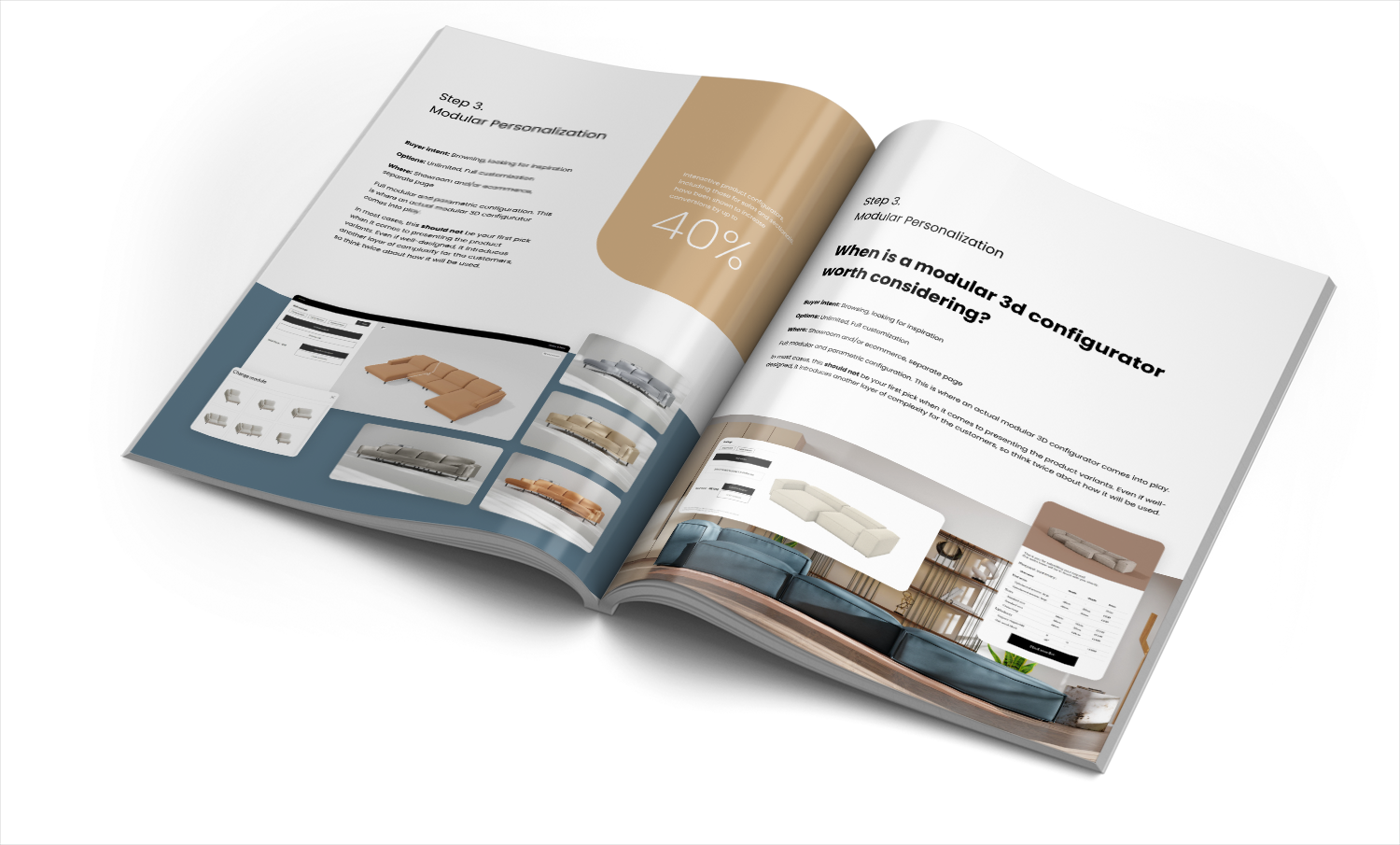The Ultimate 2025 Sofa Configuration Guide
Get your free copy todayy!

Furniture showrooms contend with a hidden problem: vast display areas packed with static arrangements, yet shoppers often leave undecided or overwhelmed. How do you turn a browsing visitor into a confident buyer, while showcasing the true potential of your offer—without doubling floor space or staff? Touchscreen kiosks, equipped with advanced configurators, are transforming this experience from passive to interactive, delivering measurable gains. Here’s how.
Many customers walk into a furniture showroom dazzled by choices but unable to visualize combinations, colors, or how a product fits their unique space. This indecision often lengthens the sales cycle or causes lost opportunities. Touchscreen kiosks for showroom sales enablement address this by letting visitors instantly explore, customize, and visualize thousands of combinations on a large, engaging digital interface. With every fabric, finish, or configuration rendered in real time—far more than you could ever physically display—shoppers gain clarity and confidence to commit.
| Pain Point | Traditional Showroom | With Touchscreen Kiosk |
|---|---|---|
| Variant visualization | Limited to stock setup | All combinations, colors, and modules in 3D |
| Decision time | Long, hesitant | Faster, more confident |
| Sales associate input | Manual, catalogue-based | Guided, interactive, digital and visual |
| Order errors | Prone to miscommunication | Customer self-configures; fewer mistakes |
Interactive kiosks leverage the power of 3D product configurators that handle complex variant visualization and real-time updates to reduce customer confusion and accelerate decision-making. This approach aligns with strategies detailed in how to speed up decision making for customized products, ensuring buyers feel empowered rather than overwhelmed.
Static showrooms hide many high-margin extras—custom upgrades, accessories, or premium fabrics—unless a sales associate happens to mention them. Touchscreen showroom kiosks change this. Built-in algorithms showcase complementary options at just the right moment in the customer’s journey, maximizing attach rate and average order value. Instead of depending on staff memory or persuasion, the kiosk makes sophisticated cross-selling automatic and intuitive.
This capability reflects proven benefits explained in can a configurator help upsell or bundle products?, where digital tools automate personalized upselling and product bundling to boost revenues. The data-driven suggestions empower customers and sales teams alike, improving attach rates without additional manual effort.
An all-too-common pain is the disconnect between a shopper’s online research and the in-store visit. Prospects start configuring a product at home but lose momentum in the store, where legacy tools or printed catalogs can’t pick up where digital left off. Modern digital showroom solutions powered by touchscreen kiosks synchronize seamlessly: customers can log in, retrieve their saved configurations, and finish in person. The sense of continuity increases conversion—no more “starting over” or abandoning the sale partway through.
This seamless cross-channel experience is a hallmark of using the same configurator online and in showrooms, improving both trust and efficiency. Implementing such unified platforms eliminates friction and helps convert leads into delighted customers.
Wasted real estate, inefficient sales consultations, and manual quoting all erode showroom ROI. Interactive touchscreen kiosks for furniture sales streamline all three. They empower self-service discovery while supporting staff with guided workflows—cutting consultation times, eliminating quoting errors, and automating data capture for CRM or production. Actual case studies show sales cycles reduced by 30–50% and order accuracy skyrocketing, which means less costly returns and higher margins.
This matches insights from how does a configurator shorten the sales cycle?, detailing how real-time visualization, instant pricing, and error-proof quoting accelerate closing. Integration with ERP and CRM systems, as described in how can a configurator integrate with my ERP system?, further reduces manual overhead and operational friction.
| Benefit | Impact Example |
|---|---|
| Faster decision cycles | Shoppers commit in one visit, not three |
| Greater configuration options | Extra SKUs visualized with zero inventory |
| Higher attach rate for upgrades | Automated prompts for accessories |
| Order transparency, less manual entry | Digital outputs sync with ERP/CRM |
| Post-visit engagement | Saved configs trigger follow-up and deals |
Notably, the elimination of quoting errors and order mistakes reflects the benefits covered in how does a configurator help reduce quoting errors?, ensuring higher margins and customer satisfaction. Additionally, reducing customer returns is a direct outcome of clearer visualization and validation.
A showroom that merely displays, without interactive enablement, risks becoming background noise in the customer’s buying journey. Touchscreen kiosks transform real estate into a sales machine—bridging online and offline, bringing every option to life, and arming your team with data-driven tools. If you’re ready to enhance customer experience, shorten your sales cycle, and boost order value, book a free 30-minute consultation. Let’s diagnose your current showroom challenges and show how interactive kiosks can turn intent into revenue, starting now.
For a comprehensive approach, consider exploring our implementation roadmap for 3D configurators and strategies for training your team to use configurators effectively in store. This ensures your investment maximizes returns through skilled adoption and seamless integration.
By leveraging modern configurator technology embedded in touchscreen kiosks, furniture showrooms revolutionize customer engagement, boost sales efficiency, and elevate overall buying experiences. For brands aiming to lead in digital transformation, this interactive approach is a critical competitive advantage.